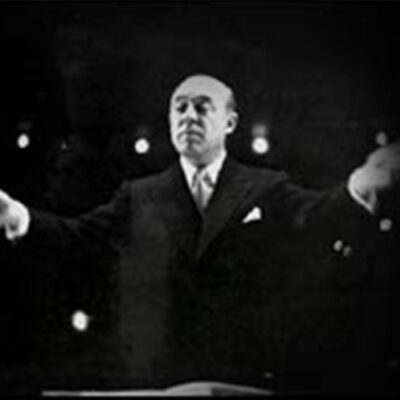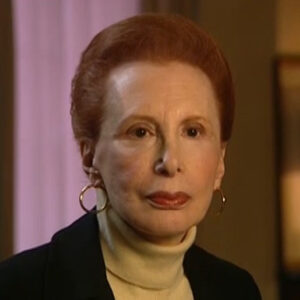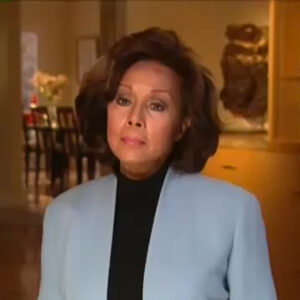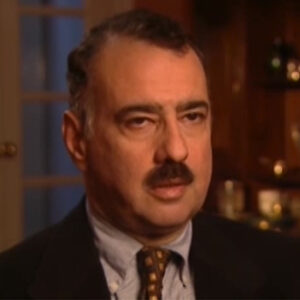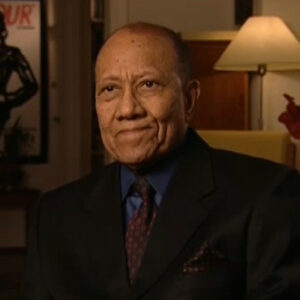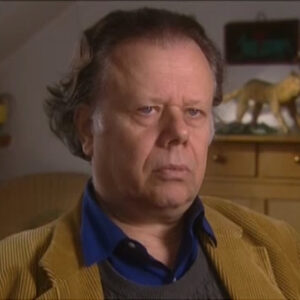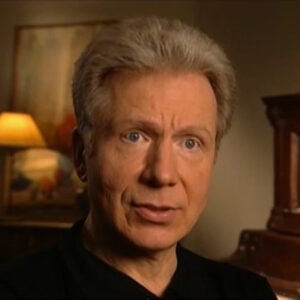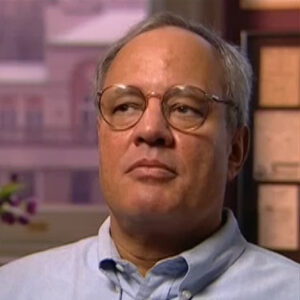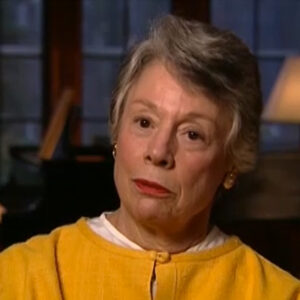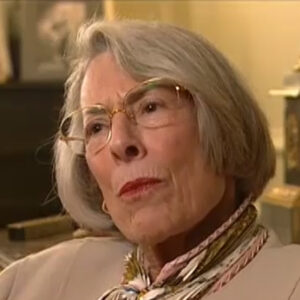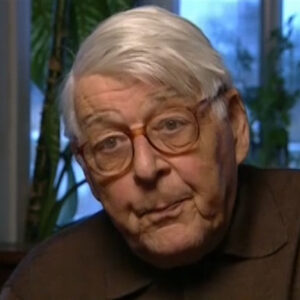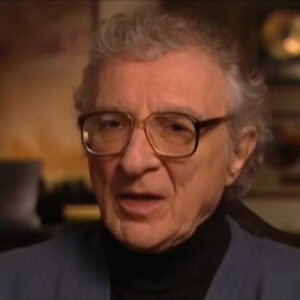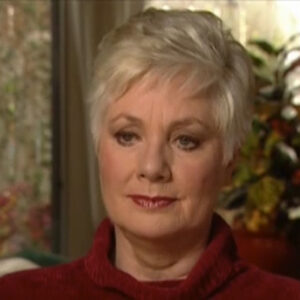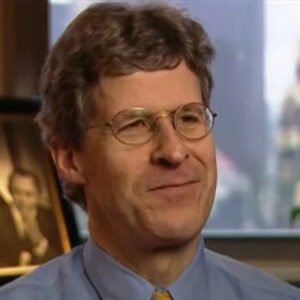Speaker 1 I came across the music cause of Rodgers and Hammerstein when I was a kid, but entirely through the medium of film and the first one I saw was Oklahoma, which made a huge impression on me. And then I guess I saw the film of Carousel and I argued with my sister because she she claimed it was a better work and a greater work than Oklahoma. And I was fiercely in defense of Oklahoma, although I loved ingredients in Carousel. I suppose most notably in Carousel, the overture. I used to sing it to myself a great deal. And and since at that time I say I was I was a kid, you know, I said, I’m 12, 13, 14. And it was it was during that period of my life, I was fantasizing about becoming an actor. And that was bound up with some notion that perhaps I could be a musical performer then, you know, I needed material to to sing, material to fantasize with. And both Oklahoma and Carousel provided me with those opportunities. I mean, along with singing in the Rain and Wind and call me Madam and stuff. But yeah, it was it was the great filmed music course then going on to the King. And I were obviously the the your brother impact was, was indelible and and thrilling. I mean, I know that there were so many other wonderful performances in that film, but something about your brain that just heightened the whole experience that seemed to be so daring and and so potently emotional at the end. And then, of course, finally I saw The Sound of Music. But I think by the time that I saw Sound of Music in the cinema, I had seen a number of Rodgers and Hammerstein musicals in the theater. And I
Speaker 2 was always
Speaker 1 saddened by the theater experience because I just felt they couldn’t live up to what had been accomplished on on film. That the film medium demonstrated that, um, Rodgers and Hammerstein work stood up to the scrutiny of the camera. I mean, I’m not sure that I would put it in those terms when I was 12 years old. But but I guess what I was responding to was that it was it was so wonderful to discover that a musical work could be that real, that they could be filmed in in completely real surroundings. Um, you know, in the case of Oklahoma with them, with prairies and great open spaces and wonderful landscapes. And yet that could be combined with a dream sequence where a highly theatrical version of that reality could be presented.
Speaker 2 And in theatre,
Speaker 1 I missed that. That credibility, that believability, magic. I’m talking about a very great cultural achievement. I think the MGM musicals is a kind of generic term. I’m sure they weren’t all made by MGM. But but when when one thinks of the period of the MGM musicals that
Speaker 2 achieved something
Speaker 1 quite phenomenal in popular culture, the standards of presentation, of of choreography, of design, of of invention and of acting detail. And the technical standards were. Where artists were working to play back again, none of us knew that then we thought they were on a prairie singing. But but those those achievements of play back in those days, I mean, there were
Speaker 2 so many breakthroughs. And the great sadness is that it’s been lost. You know, we can think of the period
Speaker 1 of the MGM musicals and there were so many of them were were Rodgers and Hammerstein musicals that they represented to the popular culture
Speaker 2 and and with the
Speaker 1 advance of rock and roll and and a different expectation by film audiences is sort of Transpac. Well, certainly for generations now.
Speaker 2 And film musicals don’t get mad or just very, very occasionally something like Evita will happen.
Speaker 1 And it’s very exciting. And you you sense the possibility of it all over again. But for the most part, it’s it’s a lost desire, you know, like stained glass windows have been lost. They’re not made anymore.
Speaker 2 And I lament that.
Speaker 1 I think it’s such a dreadful shame that something that the international and multicultural influence has gone.
Speaker 3 Let’s jump ahead and have my questions. You had to wait out for just a second. Can you stay and move over to the 12 year old who then saw the sort of films and then saw the plays and was disappointing to the adults who then goes and tackles? These incredible musicals. Did you bring some of that childhood disappointment with you? Was there a little bit of trepidation? Tell me about that.
Speaker 1 Oh, well, I got into, uh, involvement with music theater in a very different way from from how I had imagined I
Speaker 2 I became a performer
Speaker 1 and a stage performer very briefly, a little bit
Speaker 2 in review and therefore
Speaker 1 some musical work. But but but largely as an actor and only for a couple of years before I started to direct. And then I suddenly discovered that there was that there was a problem period for this regional repertory company. What was required was a mass entertainment show. And somebody said a script of a musical version of Round the World in 80 Days has arrived. Do you think you could do something with it? And, you know, within days I was I was launched. Did I carry into that work an influence from this film’s most decidedly? I mean, I feel I was I was formed in, um, in ambition and and in in the sense of of of delighting in in multi disciplined work by those films, in incensing
Speaker 2 that there need to be
Speaker 1 no categorization as between good acting in plays and and not believable acting in musicals, that there need be no distinction between the kind of acting that is required in a scene and the kind of acting that’s required in a lyric of a song. And I think those perceptions were fundamental to Rodgers and Hammerstein.
Speaker 2 They weren’t
Speaker 1 always fundamental. I mean that
Speaker 2 we know
Speaker 1 that the modern musical was invented many times over the legend. Is that really it was Oklahoma that
Speaker 2 that
Speaker 1 redefined the genre. But we also have a nagging sense of, well, maybe it was showboat and maybe it was Porgy and Bess a bit. And and, you know, well, maybe, pal Jerry did some remarkable things that hadn’t been done before. I mean, you know, history isn’t quite like that. Of course, advances are made with some sort of gradualism. But unquestionably, Oklahoma set out to musicalized.
Speaker 2 A play, an already existing
Speaker 1 play of some
Speaker 2 complexity and sensitivity almost entirely expressed
Speaker 1 through character. Green growth, Alex was not a hugely successful Broadway play, it was admired, but it was it was rather Jakov in nature. Not a great deal happened and most of its effects were were to do with insights into character and revelations of character that people living out in Indian territory at the turn of the century could have had, um,
Speaker 2 very sophisticated and subtle perceptions about
Speaker 1 their own natures and the condition that they were in and the sense of their place in history and the sense of of what kind of society they they wanted and whether society was going to be dominated by bullying and and land grabbing and violence
Speaker 2 or whether a kind of goodness and common sense was
Speaker 1 what was going to be more important for the future of America.
Speaker 2 These are quite subtle
Speaker 1 things to to communicate.
Speaker 2 So it was an extraordinary choice
Speaker 1 for Rodgers and Hammerstein to to to say that they wanted to musicalized that. The astonishing thing is
Speaker 2 the faithfulness
Speaker 1 that they exhibited towards the original.
Speaker 2 They didn’t say, oh, I
Speaker 1 will just use green rather than as a kind of starting point. But but,
Speaker 2 you know, we will need
Speaker 1 a huge
Speaker 2 opening chorus and,
Speaker 1 you know, we’ll need a lot of vaudeville ingredients. So, hey, let’s let’s introduce a
Speaker 2 touring theatre that passes through the territory. You know, I mean, you can imagine all kinds of
Speaker 1 ways in which
Speaker 2 cynical
Speaker 1 producers or cynical writers might have said, you know, let’s give this some
Speaker 2 pizzazz. And instead,
Speaker 1 Rodgers and Hammerstein committed to, um,
Speaker 2 making a musical work of that detailed, sensitive,
Speaker 1 sophisticated material.
Speaker 2 And therefore, the interest
Speaker 1 was going to be to
Speaker 2 what extent the
Speaker 1 music could express character and conflict and foreboding, exhilaration, innocence, pride, and to what extent
Speaker 2 a lyric could could contain narrative and therefore not be like the history
Speaker 1 of Broadway lyrics, that they could be movable from one show
Speaker 2 to another to another because, you know, they’re about catchall situations, but specifically about individuals and the crises that individuals find themselves in. To what extent? Could the writers
Speaker 1 discover
Speaker 2 in a confluence
Speaker 1 of of music and lyric,
Speaker 2 a kind of wit that was essentially understated, nothing to do with gags, nothing to do with stage performance,
Speaker 1 to try to do with
Speaker 2 the the
Speaker 1 understatement of of gentle mockery or satire or the exaggeration of characteristic behavior
Speaker 2 and.
Speaker 1 Therefore, when Oklahoma, based upon an unsuspecting world,
Speaker 2 I think it
Speaker 1 must have seemed to that audience that something utterly other had been invented. I mean, the point was made to me when we were doing Oklahoma, and
Speaker 2 I was very convinced by it that
Speaker 1 before Oklahoma, um, the idea of the Broadway musical was twofold,
Speaker 2 that it was not only
Speaker 1 a musical that happened on Broadway because it was so successful and because audiences flocked to it. And so but
Speaker 2 it was a musical about
Speaker 1 Broadway.
Speaker 2 It was about show people. It was about backstage. It was about we’re putting on a show.
Speaker 1 It was about a dance troupe or, you know, let’s
Speaker 2 do the show here in the barn. It was somehow the validation of people singing was it was all it’s OK because they are performers. Now, I know that
Speaker 1 that showboat
Speaker 2 explored real situations as well, in addition to the idea that they are all performers and an entertainment is
Speaker 1 being devised. And of course, the great Porgy and Bess, which is not a musical, was an opera,
Speaker 2 had had pioneered
Speaker 1 the singing and expression of of innermost thoughts through a kind of popular idiom,
Speaker 2 but. I think when
Speaker 1 a Broadway audience was
Speaker 2 confronted with a world that
Speaker 1 was no longer a mirror to them, that was strange. It was
Speaker 2 it was
Speaker 1 about regional people and it was about
Speaker 2 regional people from a much earlier
Speaker 1 period in time.
Speaker 2 The first questions must have been, why are we interested in this at all? I mean, you know, the musical is a natural form. And the daring of
Speaker 1 an overture giving way to silence then to natural sound is wonderful instruction at the beginning of Oklahoma that for a while
Speaker 2 there is only
Speaker 1 natural sound. I mean, there’s only the blowing of cattle and possibly the cackling of some geese and some twittering birds and. What we’re in some real
Speaker 2 soundscape and then
Speaker 1 unaccompanied, a boy is singing to himself
Speaker 2 from a distance,
Speaker 1 not instant and present and right on top of us, and beautifully articulated, but from a
Speaker 2 distance and only gradually does orchestral sound come in to support him. And and his song is a folk song, and yet it expresses that this is a very particular day in the calendar. This is maybe the only day of
Speaker 1 social entertainment that people in this region have the one day in a year where
Speaker 2 there’s a celebration and therefore it’s a day in the year where maybe something about
Speaker 1 your future is going to be decided. The one area where maybe you’re going to meet a girl or a girl who’s going to meet a boy or or because farmers don’t come and don’t get on, maybe you’re going to come across somebody you’ve never met before from from the other side, because
Speaker 2 it’s the kind of day of truce.
Speaker 1 Oh, what a beautiful morning, we
Speaker 2 discover something about the poetic nature of
Speaker 1 that young man, we discovered
Speaker 2 something about the
Speaker 1 the impact that the outdoor experience has for him, the
Speaker 2 thrill and the joy that he takes when he’s somebody special is he can’t he just take things for granted and he can articulate them perfectly. But he also gives a sense of excitement that are maybe maybe today is the day. So we’re utterly engaged by those ingredients now. I think that
Speaker 1 that Broadway audience must have been
Speaker 2 utterly amazed by
Speaker 1 it, but by such a an opening to a show, something
Speaker 2 of a completely different nature
Speaker 1 was going on.
Speaker 2 And they must have said to themselves, how was it achieved? I mean,
Speaker 1 presumably the composer did were all composers do, which is that, you know, he opens the bottom drawer and
Speaker 2 he finds what melodies he’s got in there and offers them
Speaker 1 up to the lyricist and the lyricist put some words to it
Speaker 2 and they kind of gradually arrange them in in
Speaker 1 some sort of good show order. Is that what they did?
Speaker 2 Well, no, they didn’t. The lyricist began by writing what that first statement
Speaker 1 needed to contain,
Speaker 2 began by writing character, began by writing situation, began by saying something has got to define not only where we are, but what kind of individual we’re dealing with. And then the composer
Speaker 1 looked at those words
Speaker 2 and responded
Speaker 1 to create something that has got
Speaker 2 a Copeland like
Speaker 1 descriptive A.. It’s got a folkloric memorability.
Speaker 2 It’s exhilarating music, you can orchestrate this and take it ever on and on upwards into something that describes the whole landscape, but it’s entirely singable by it. But by by the solo voice, the composer took the lyric, the lyric and created. That musical description. Completely the other way around from how he had ever previously worked. So you’re dealing with a genius.
Speaker 3 You had started this by saying that, um, the music conveyed emotions so that the actors didn’t have to do that. Give an example a little bit about how that’s accomplished. Tell me that he does that again. And also, was it a surprise for you when you actually got into it?
Speaker 2 I think. What I was
Speaker 1 saying about Rodgers and Hammerstein writing. First and foremost for character
Speaker 2 and then
Speaker 1 writing about situation. Meant that. Actors didn’t have to change
Speaker 2 gear,
Speaker 1 didn’t have to change the the
Speaker 2 the detail of their communication when because once
Speaker 3 we got so I must say it was just coming in.
Speaker 2 OK, OK, let’s try this again.
Speaker 3 How does how is emotion conveyed through you understand.
Speaker 2 I’m saying that. Rodgers and Hammerstein more or less invented
Speaker 1 writing songs that express character
Speaker 2 and
Speaker 1 take place in situation, and because of it, imagine that an actor has
Speaker 2 just played a
Speaker 1 complex scene in in speech
Speaker 2 under
Speaker 1 the last speech. Music begins to come in. We know that a song is arriving,
Speaker 2 but instead of the the old Broadway technique that as the
Speaker 1 music arrives,
Speaker 2 the actor switches gear and becomes a performer and becomes somebody who is selling a number, becomes
Speaker 1 somebody who is delivering the goods. Rodgers and Hammerstein
Speaker 2 require the actor to stay entirely in character and that the progression from speech to speech with music underneath to singing is seamless, that absolutely no distinction can be drawn. And everything that the actor is detailing of that character in the scene previously will be present in in the presentation of the
Speaker 1 lyric
Speaker 2 so that the lyric seems to be coming from the character’s brain. The the the words that are being sung are being sung because the character needs to sing them and because the character is inventing them rather than because they have been previously written down and learned and are being sucked out in in a performance. Of course, it’s a it’s a very different perception about what you want a song to do instead of a song being plucked out and becoming something different. The song heightens and intensifies
Speaker 1 the character experience.
Speaker 2 So. To to be really successful with a Rodgers and Hammerstein music and lyric, then one really has
Speaker 1 to work in a in a stanislavski’s way, in a methodological
Speaker 2 way, in a way that says I need a back story for my character and I need or I need to be able to improvise, make I need to know how my character is going to behave under any given circumstances because I want my character to be that real when my character is singing. And I think that Richard Rodgers music on so many occasions is such a truthful response
Speaker 1 to a character and situation that
Speaker 2 when when actors really immerse themselves in the
Speaker 1 process,
Speaker 2 they can actually communicate. Not only that they’re inventing the lyric, but they’re inventing the music. I mean, that that they they are creating that musical phrase because that’s what their character needs at that point. Now, I’m being fanciful. I mean, I’m I’m I’m putting it at a certain extreme, but I think it’s possible to approach the Rosen Hammerstein ever in in that way. And there aren’t many achievements in
Speaker 1 musical theater where that can be claimed,
Speaker 3 go back and decided to do this play fifty seven years after it was written. And maybe you could tell us that and tell us how you got inside hearing
Unidentified yet years later.
Speaker 3 And maybe you can say we were flying the plane, you know,
Speaker 2 there’s a history at the
Speaker 1 National Theatre of an essentially serious, mainly classical theater company doing a musical work from time to time. And audiences flock to such musical works here, because I suppose there is partly a sense of a classical theatre company letting its hair down of of a more populist and popular event happening in these classical surroundings.
Speaker 2 So this kind of release that occurs.
Speaker 1 So naturally what happens at National Theater is that we we searched through the great musical repertoire to find works that are appropriate. And a wonderful breakthrough was made here several years ago when the National Theater production of Carousel, which was directed by Nick Hytner. And it it it was a revelation that all of the things that I’ve been describing about the way that the possibilities of of detailed and truthful
Speaker 2 acting and
Speaker 1 the show having
Speaker 2 an altogether more substantial meaning
Speaker 1 than than was perhaps first appreciated when it was when it was presented in America,
Speaker 2 all
Speaker 1 contributed to a terrific excitement that surrounded that production. And when I came here, it was clear that it wouldn’t be long before
Speaker 2 another major
Speaker 1 musical work would have to be done.
Speaker 2 And I found myself and. Almost automatically restudying
Speaker 1 the the Rodgers and Hammerstein catalog, because that’s where my admiration has resided for for
Speaker 2 many a year and asking myself which
Speaker 1 of the and have
Speaker 2 so and when
Speaker 1 I came to the National, it was clear that it wouldn’t be long before I would have to nominate just such a musical work. And and I suppose almost automatically I find myself going to the Rodgers and Hammerstein catalog where where, as I’ve suggested.
Speaker 2 But my admiration resided. And I was thinking which of the
Speaker 1 works other than Carrousel would lend itself to a really substantial re-examination?
Speaker 2 And of course, I remembered the experience
Speaker 1 of seeing the film,
Speaker 2 and I compared the
Speaker 1 film experience with having seen Oklahoma in the theater a few
Speaker 2 times. And I thought that that really has to be the solution because this was an epoch making
Speaker 1 work,
Speaker 2 a genre shifting work, and I’m not sure that any longer.
Speaker 1 That’s understood certainly in this country.
Speaker 2 And that it’s it’s a work that is ripe for exploration, both stylistically.
Speaker 1 I mean, in in terms of design, in terms of the the naturalistic detail that’s that’s required throughout the work in terms of creating a believable community.
Speaker 2 And I love
Speaker 1 works that that require the the
Speaker 2 the interacting
Speaker 1 of a complex community.
Speaker 2 And I also thought that sufficient time
Speaker 1 had gone by since there had been a production in this country
Speaker 2 for us
Speaker 1 to ask the Rodgers and Hammerstein state for permission to to relocate straight to to rework some of the material musically in in terms of allowing us to create a more filmic structure for the piece scene changes
Speaker 2 to allow the flow of the thing
Speaker 1 to be more contemporary and for permission for the show to be choreographed. Now, that was a much taller order because very understandably, the agonised about choreography had been maintained throughout the history of the show because it was it was a wonderful achievement and because a kind of identity of American dance, a kind of vigor and and robustness of American dance, had been established by actors to go
Speaker 2 through that show. And and it was
Speaker 1 something that the Ross and Hammerstein state wanted to go on celebrating.
Speaker 2 But they
Speaker 1 recognized that, you know, the world had changed and and that there was great richness of choreographer invention available
Speaker 2 and that perhaps this would be a good moment to reconsider, particularly because I was proposing doing the work on a very differently shaped stage from
Speaker 1 the constricted proscenium stage. That was it was usually used for such presentations. I was urging that there shouldn’t be
Speaker 2 an orchestra pit
Speaker 1 between the stage and the audience, that that was not because
Speaker 2 of the design of the theater, but because I wanted the level
Speaker 1 of credibility
Speaker 2 that the investment that the audience could make and the
Speaker 1 reality of the situation as it was watching not to
Speaker 2 be dissipated by the
Speaker 1 constant presence of a conductor and orchestra lights and
Speaker 2 something that reminded the perpetually of the
Speaker 1 falsity of the occasion.
Speaker 2 And so
Speaker 1 we organised the stage where the orchestra would be revealed
Speaker 2 at the. The rear of the event,
Speaker 1 but otherwise, when they were disguised, when their presence was covered by a black cloth coming in, that they were no longer visible.
Speaker 2 The stage space, therefore, was huge and thrust
Speaker 1 out into the audience
Speaker 2 and therefore a lot of the shapes and forms
Speaker 1 of the atmosphere, the choreography wouldn’t really
Speaker 2 very happily apply. I’m bound to say
Speaker 1 that that throughout this, the Russian Hammerstein estate were
Speaker 2 extraordinarily enlightened
Speaker 1 in in the way that they dealt with somebody who was banging on their door saying, please, can I make changes?
Speaker 2 Because one often discovers that the habit of mind of A
Speaker 1 is to say,
Speaker 2 no, this work is in aspic and and it must be preserved in exactly that
Speaker 1 form. You know, you mustn’t touch it in any way. It’s got to remain changeless.
Speaker 2 And Rosenbaum’s then state
Speaker 1 and that the members
Speaker 2 include
Speaker 1 Mary Rogers, who’s a great theatre practitioner herself, and included Jamie Hammerstein, the late Havenstein, who was a brilliant theatre director
Speaker 2 because they were practitioners, they they immediately wanted to know. They were curious. It was no sense of woe. You know, this is off limits. There was well, tell us more. And but how would that work? And. Well, OK, explore this and let’s see how it works, though, that, you know, we all want to agree that it it it it’s a move forward, don’t we? I mean, it seemed to me that the whole attitude was enlightened and therefore conducive. And everybody worked together to take the show to a late 20th century presentation rather than a mid
Speaker 1 20th century presentation.
Speaker 2 And therefore, they readily
Speaker 1 accepted the proposal of Susan Stroman as character for which was I mean, thank
Speaker 2 heavens for that, because
Speaker 1 Susan’s contribution was quite phenomenal.
Speaker 3 Let me ask you, because we’re running out of time. And as you started to mount the show, were there any surprises that you found, especially in the.
Speaker 2 That I mentioned
Speaker 1 before, that
Speaker 2 there are ingredients
Speaker 1 in the score of Oklahoma
Speaker 2 that remind me of Copeland and that also remind me in places
Speaker 1 of of late Gershwin
Speaker 2 and and a kind of influence that was imbibed by
Speaker 1 Leonard Bernstein
Speaker 2 that that the score had a much greater expansiveness and descriptive ness contained in it than was usually assumed to be the case. And I listened to a number of recordings and I discovered that in so many cases that the the chosen tempi were conducive to a kind of vaudeville, two to a slightly two dimensional entertainment, to something that would have razzamatazz and that with Tempy that were were more descriptive of.
Speaker 1 The spaciousness that that Rogers was describing, that that
Speaker 2 Copeland
Speaker 1 ingredient emerged,
Speaker 2 I think particularly of that sort of that wonderful early hymnal
Speaker 1 tune that he plays for poor is dead.
Speaker 2 I think the achievement of of that song in lyric and and music is a wonderful
Speaker 1 definition of what I’m talking about.
Speaker 2 That tune could be played on a primitive harmonium and you would be instantly
Speaker 1 transported to the lawless west of the end of the 19th century.
Speaker 2 But it’s a wonderfully memorable tune. It it can be used in the overture.
Speaker 1 We did use it in the which should be slightly orchestrated in the overture to
Speaker 2 create a sense of vastness and yet a sort of sense of virgin innocence about
Speaker 1 this territory.
Speaker 2 But in the show, it can also be used to deliver comic punch lines of such of such skillfulness when Curlee is very slightly.
Speaker 1 Tilting at Judd,
Speaker 2 not daring to go too far in case Judd sees through it and becomes cantankerous
Speaker 1 and
Speaker 2 physically threatens him just to amuse himself to
Speaker 1 to to to have
Speaker 2 fun at his expense to find out more about Judd. And then, so surprisingly, to discover her kind of unexpected innocence in Judd, where Judd begins to sing along with it and begins to participate in the idea that the people could think well of him when he’s dead. And a sort of neediness, a kind of touching neediness. All of those things are expressed in that music. I mean, a great range of of of of things. The the brilliant
Speaker 1 wit that’s involved in people will say we’re in love. There’s a wonderful inversion in the lyric, but
Speaker 2 the music makes it possible for this kind of much ado about nothing. Beatrice and Benedick contention to happen between two young lovers who are scoring points from each other while insisting that they’re not in love with each other. And yet the music is telling us we’re listening to two lovers. It’s it’s beautifully complex that those achievements are rare and the the wonderful dance music. I mean, of course,
Speaker 1 Richard Rodgers wrote great dance music. You know, he slaughter on Tenth Avenue and and that, you know, it’s it’s it’s he understood everything about dance.
Speaker 2 But in Oklahoma, the whole
Speaker 1 sequence of
Speaker 2 cowboys and
Speaker 1 farmhands who are at loggerheads, who are daggers drawn, guns drawn,
Speaker 2 he creates the sense of
Speaker 1 a pioneering group of people doing. Dancers that are handed down from different backgrounds, different cultures, there’s a there’s
Speaker 2 a wonderful folk flavor
Speaker 1 to it, and yet
Speaker 2 he can
Speaker 1 work it up to the point where he can have an audience standing
Speaker 2 at the end of that dance
Speaker 1 sequence.
Speaker 2 That’s not just the work of the orchestrator and
Speaker 1 the work of the dance arranger and
Speaker 2 the work of the choreographer. There’s something in that music that that that Rodgers understands. I’m going to use that because that’s going to get people lifted out of themselves.
Speaker 3 How influential do you think Rodgers is, Rodgers and Hammerstein and specifically Richard Rodgers is today? Is it still with theater being what it is today without.
Speaker 1 I would say that with Richard Rodgers, one hundredth anniversary approaching,
Speaker 2 we are
Speaker 1 probably coming up to a period where there will be a large number of Rodgers and Hammerstein revivals around the world.
Speaker 2 And I think as more and more
Speaker 1 of Russian Hammerstein’s work is done, what will be proved is that their work endures.
Speaker 2 That it is every bit
Speaker 1 as appropriate to to entertain people in the 21st century as as it was in the 20th,
Speaker 2 that what they chose to write about
Speaker 1 was frequently ahead of its time. And we’ve talked about the the the daring of creating a show about ordinary people, as opposed to to show people that the daring of creating a show about the blinkered attitudes that exist in American society, indeed, that exist throughout the world towards race, towards racial integration, towards any idea of of, uh, of the races and marrying and and living in harmony. It’s extraordinary that South
Speaker 2 Pacific
Speaker 1 was vilified for a number of years as being that’s that show that is sort of
Speaker 2 slightly racist in its attitudes. It is completely the opposite. It’s a show that is saying these attitudes exist and must be banished, must be confronted. And and, you know, this was a show that they they chose to do immediately after a sense of American domination in the wake of the Second World War. You know, there are other issues. There are things that we have learned as a result of this war. And The Sound of Music is it is a show about about human values and and the influence of one person being a truth teller and standing up to certainly in familial terms, standing up to a fascist regime, escaping a fascist regime, having no more to do with rejecting the. They did it repeatedly in in the writing lifetime, and I think because they were daring and because they were dramatists more than they were popular entertainers, then the works can be revisited and and and can continue to be revisited and will give different answers to different generations. You will gather that I’m a passionate
Speaker 1 advocate of the work of
Speaker 2 and Hammerstein. I very much
Speaker 1 want to do another work
Speaker 2 by them and hopefully more.
Speaker 3 Would it make any sense to ask you you because you’ve answered it pretty much just to what is Richard Rodgers legacy?
Speaker 2 Quite specifically,
Speaker 1 my colleague and friend Andrew Lloyd Webber acknowledges a direct inheritance. He he he studied the scores of Richard Rodgers. He he plays them over and over. He he believes that Richard Rodgers was the presiding genius of the 20th century musical. And and he believes himself to be in in that tradition. What’s fascinating that we’ve talked about the the the Richard Rodgers gene passing to his daughter. And of course, we know now that there’s already another generation in the Rodgers family, which is producing very fine and very particular musical output.
Speaker 2 I think I think his his influence on on
Speaker 1 current musical
Speaker 2 theatre remains
Speaker 1 profound.
Speaker 2 And if it weakens, then my
Speaker 1 advice would be to all people concerned with the music theatre to go
Speaker 2 back and study him because because the music theatre only ever works in the terms that I understand it and admire it when it is
Speaker 1 musical
Speaker 2 drama, when when the dramatic
Speaker 1 content of the music is first and foremost.
Speaker 2 And that was Roger’s contribution, his musical dramatist.
Speaker 3 Last question, very fanciful. You Never Walk Alone, which has been adopted by football fans all across England, is a Richard Rodgers song, Rodgers and Hart. Could you perhaps tell us that? And my question is, what’s up with that being an American? And we’re going to have a clip of that to show of fans singing. Americans are just wild to think that
Speaker 1 it is extraordinary that football fans all over it, but very particularly football fans in Liverpool and Manchester sing the Rodgers and Hammerstein song You’ll Never Walk Alone from the End of Carousel. And it
Speaker 2 comes about because at the time when the Beatles
Speaker 1 burst upon the scene,
Speaker 2 there was a musical
Speaker 1 revolution in this country
Speaker 2 and there was a rival group
Speaker 1 to the Beatles called Gerry and the Pacemakers. But but they were a Liverpool group.
Speaker 2 And amongst their many hit records, they
Speaker 1 recorded a sort of heavy beat rock and roll version of it, You’ll Never Walk Alone.
Speaker 2 And it was a wonderful perception of theirs that there was a great tune and and
Speaker 1 there was something very emotional about it.
Speaker 2 But it didn’t have to be sung by a middle aged lady. You know,
Speaker 1 that there was something
Speaker 2 more vigorous about it. And it it was taken up by Liverpool
Speaker 1 football fans as a way of because it
Speaker 2 was wonderful to sing in chorus because it was hip. I mean, it was it was a genuine pacemaker’s song. And and then as far as
Speaker 1 different football clubs and
Speaker 2 football fans have seen that it’s wonderfully effective and it can raise the the emotional content of a game. It can it can raise the spirits of a team that is is behind the needs to equalize. And come on, let’s sing. You’ll never walk alone, you know? I mean, you know that don’t don’t don’t give in whatever happens or will never walk alone. You’ll never walk alone because because we are the greatest. There’s an emotional surge to it.
Speaker 1 And that’s why it’s it’s become that kind of football. So.

